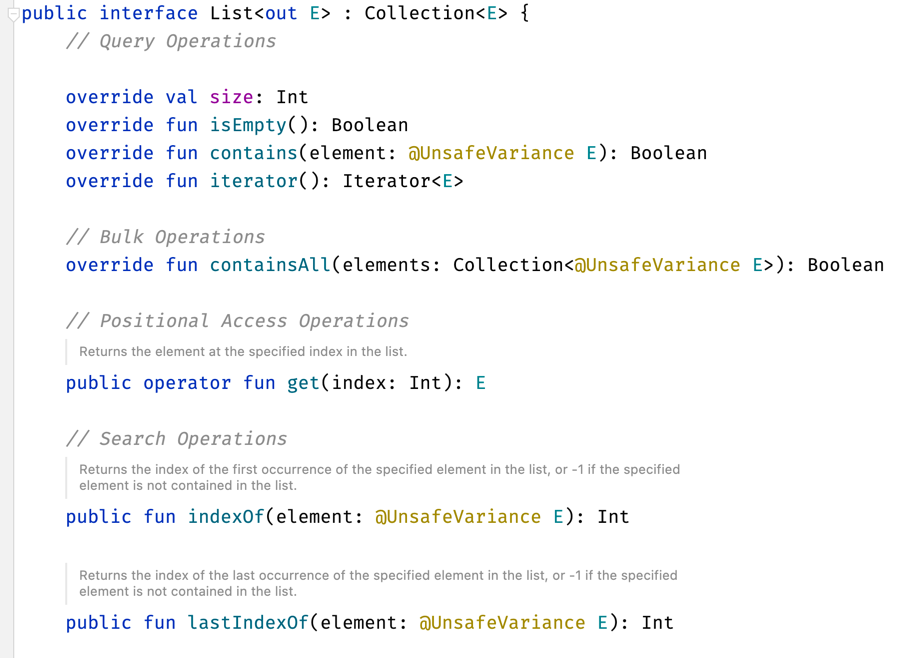
In the previous parts, we already discussed theoutandinvariance modifiers with their practical use cases, and a popular pattern I call the Covariant Nothing Object.
Arrays::sort that make generic operations on arrays of every type.Integer[] numbers= {1, 4, 2, 3};
Arrays.sort(numbers); // sorts numbers
String[] letters= {"B", "C", "A"};
Arrays.sort(letters); // sorts letters
// Java
Integer[] numbers= {1, 4, 2, 3};
Object[] objects = numbers;
objects[2] = "B"; // Runtime error: ArrayStoreException
numbers to Object[] didn't change the actual type used inside the structure (it is still Integer); so, when we try to assign a value of type String to this array, an error occurs. This is clearly a Java flaw, but Kotlin protects us from it by making Array (as well as IntArray, CharArray, etc.) invariant (so upcasting from Array<Int> to Array<Any> is not possible).Dog type is used in an in-position. Note that every object type can be up-casted; so, when we expect a Dog, we might actually receive any of its subtypes, e.g., a Puppy or a Hound.open class Dog class Puppy : Dog() class Hound : Dog() fun takeDog(dog: Dog) {} takeDog(Dog()) takeDog(Puppy()) takeDog(Hound())
in modifier, because they allow a type to be transferred to a lower one, e.g., from Dog to Puppy or Hound. This only limits class use, so it is a safe operation.open class Dog class Puppy : Dog() class Hound : Dog() class Box<in T> { private var value: T? = null fun put(value: T) { this.value = value } } fun main() { val dogBox = Box<Dog>() dogBox.put(Dog()) dogBox.put(Puppy()) dogBox.put(Hound()) val puppyBox: Box<Puppy> = dogBox puppyBox.put(Puppy()) val houndBox: Box<Hound> = dogBox houndBox.put(Hound()) }
out modifier. Just think what would happen if you could upcast Box<Dog> to Box<Any?>. If this were possible, you could literally pass any object to the put method. Can you see the implications of this? That is why it is prohibited in Kotlin to use a covariant type (out modifier) in public in-positions.class Box<out T> { private var value: T? = null fun set(value: T) { // Compilation Error this.value = value } fun get(): T = value ?: error("Value not set") } val dogHouse = Box<Dog>() val box: Box<Any> = dogHouse box.set("Some string") // Is this were possible, we would have runtime error here
set, that allow their modification.class Box<out T> { private var value: T? = null private fun set(value: T) { // OK this.value = value } fun get(): T = value ?: error("Value not set") }
out modifier) is perfectly safe with public out-positions, therefore these positions are not limited. This is why we use covariance (out modifier) for types that are produced or only exposed, and the out modifier is often used for producers or immutable data holders. Thus, List has the covariant type parameter, but MutableList must have the invariant type parameter.Amphibious is in an out-position; when we might expect it to be Amphibious, we can also expect it to be Car or Boat.open class Car interface Boat class Amphibious : Car(), Boat fun getAmphibious(): Amphibious = Amphibious() val amphibious: Amphibious = getAmphibious() val car: Car = getAmphibious() val boat: Boat = getAmphibious()
out modifier. Upcasting Producer<Amphibious> to Producer<Car> or Producer<Boat> limits what we can expect from the produce method, but the result is still correct.open class Car interface Boat class Amphibious : Car(), Boat class Producer<out T>(val factory: () -> T) { fun produce(): T = factory() } fun main() { val producer: Producer<Amphibious> = Producer { Amphibious() } val amphibious: Amphibious = producer.produce() val boat: Boat = producer.produce() val car: Car = producer.produce() val boatProducer: Producer<Boat> = producer val boat1: Boat = boatProducer.produce() val carProducer: Producer<Car> = producer val car2: Car = carProducer.produce() }
in modifier). If Producer type parameters were contravariant, we could up-cast Producer<Amphibious> to Producer<Nothing> and then expect produce to produce literally anything, which this method cannot do. That is why contravariant type parameters cannot be used in public out-positions.open class Car interface Boat class Amphibious : Car(), Boat class Producer<in T>(val factory: () -> T) { fun produce(): T = factory() // Compilation Error } fun main() { val carProducer = Producer<Amphibious> { Car() } val amphibiousProducer: Producer<Amphibious> = carProducer val amphibious = amphibiousProducer.produce() // If not compilation error, we would have runtime error val producer = Producer<Amphibious> { Amphibious() } val nothingProducer: Producer<Nothing> = producer val str: String = nothingProducer.produce() // If not compilation error, we would have runtime error }
in modifier) in public out-positions, such as a function result or a read-only property type.class Box<in T>( val value: T // Compilation Error ) { fun get(): T = value // Compilation Error ?: error("Value not set") }
class Box<in T>( private val value: T ) { private fun get(): T = value ?: error("Value not set") }
in modifier) for type parameters that are only consumed or accepted. A well-known example is kotlin.coroutines.Continuation:public interface Continuation<in T> { public val context: CoroutineContext public fun resumeWith(result: Result<T>) }
class Box<in T1, out T2> { var v1: T1 // Compilation error var v2: T2 // Compilation error }
out modifier) in public in-positions is considered unsafe, therefore such a situation blocks code compilation. Still, there are situations where we would like to do this anyway because we know we will do it safely. A good example is List.List interface is covariant (out modifier), and this is conceptually correct because it is a read-only interface. However, it uses this type of parameter in some public in-positions. Just consider the contains or indexOf methods: they use covariant type parameters in a public in-position, which is a clear violation of the rules we just explained.
UnsafeVariance annotation, which is used to turn off the aforementioned limitations. It is like saying, "I know it is unsafe, but I know what I’m doing and I will use this type safely".
UnsafeVariance for methods like contains or indexOf because their parameters are only used for comparison, and their arguments are not set anywhere or returned by any public functions. They could also be of type Any?, and the type of those parameters is only specified so that a user of these methods knows what kind of value should be used as an argument.// Declaration-side variance modifier class Box<out T>(val value: T) val boxStr: Box<String> = Box("Str") val boxAny: Box<Any> = boxStr
class Box<T>(val value: T) val boxStr: Box<String> = Box("Str") // Use-site variance modifier val boxAny: Box<out Any> = boxStr
MutableList cannot have the in modifier because then its method's result types would return Any? instead of the actual element type. Still, for a single parameter type we can make its type contravariant (in modifier) to allow any collections that can accept a type:interface Dog interface Pet data class Puppy(val name: String) : Dog, Pet data class Wolf(val name: String) : Dog data class Cat(val name: String) : Pet fun fillWithPuppies(list: MutableList<in Puppy>) { list.add(Puppy("Jim")) list.add(Puppy("Beam")) } fun main() { val dogs = mutableListOf<Dog>(Wolf("Pluto")) fillWithPuppies(dogs) println(dogs) // [Wolf(name=Pluto), Puppy(name=Jim), Puppy(name=Beam)] val pets = mutableListOf<Pet>(Cat("Felix")) fillWithPuppies(pets) println(pets) // [Cat(name=Felix), Puppy(name=Jim), Puppy(name=Beam)] }
MutableList<out T>, we can use get to get elements, and we receive an instance typed as T, but we cannot use set because it expects us to pass an argument of type Nothing. This is because a list with any subtype of T might be passed there, including the subtype of every type that is Nothing. When we use MutableList<in T>, we can use both get and set; however, when we use get, the returned type is Any? because there might be a list with any supertype of T, including the supertype of every type that is Any?. Therefore, we can freely use out when we only read from a generic object, and we can freely use in when we only modify that generic object.* instead of a type argument to signal that it can be any type. This is known as star projection.if (value is List<*>) { ... }
Any? type. It is true that List<*> effectively behaves like List<Any?>, but this is only because the associated type parameter is covariant. It might also be said that Consumer<*> behaves like Consumer<Nothing> if the Consumer type parameter is contravariant. However, the behavior of Consumer<*> is nothing like Consumer<Any?>, and the behavior of List<*> is nothing like List<Nothing>. The most interesting case is MutableList. As you might guess, MutableList<Any?> returns Any? as a result in methods like get or removeAt, but it also expects Any? as an argument for methods like add or set. On the other hand, MutableList<*> returns Any? as a result in methods like get or removeAt, but it expects Nothing as an argument for methods like add or set. This means MutableList<*> can return anything but accepts (literally) nothing.|---------------|------------------|-------------------|
|
T | T | T ||
out T | Nothing | T ||
in T | T | Any? ||
* | Nothing | Any? |- The default variance behavior of a type parameter is invariance. If, in
Box<T>, type parameterTis invariant andAis a subtype ofB, then there is no relation betweenBox<A>andBox<B>. - The
outmodifier makes a type parameter covariant. If, inBox<T>, type parameterTis covariant andAis a subtype ofB, thenBox<A>is a subtype ofBox<B>. Covariant types can be used in public out-positions. - The
inmodifier makes a type parameter contravariant. If, inBox<T>, type parameterTis contravariant andAis a subtype ofB, then Cup<B> is a subtype of Cup<A>. Contravariant types can be used in public in-positions.
- Type parameters of
ListandSetare covariant (outmodifier). So, for instance, we can pass any list whereList<Any>is expected. Also, the type parameter representing the value type inMapis covariant (outmodifier). Type parameters ofArray,MutableList,MutableSet, andMutableMapare invariant (no variance modifier). - In function types, parameter types are contravariant (
inmodifier), and the return type is covariant (outmodifier). - We use covariance (
outmodifier) for types that are only returned (produced or exposed). - We use contravariance (
inmodifier) for types that are only accepted (consumed or set).
